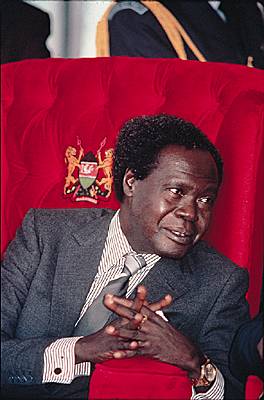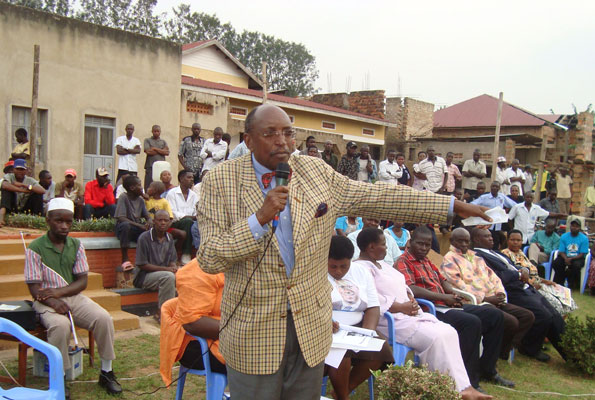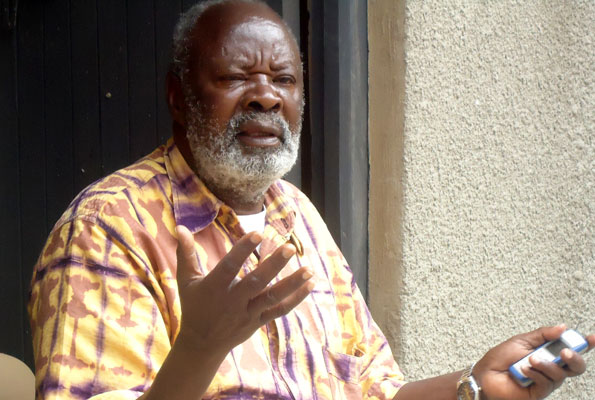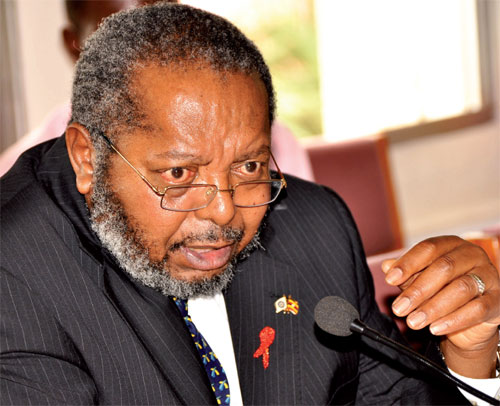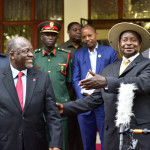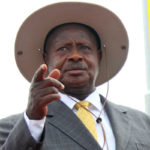Apollo Milton Obote
After the overthrow of Idi Amin in 1979, Uganda was governed by Yusuf Lule and Godfrey Binaisa. But when the 1980 elections were held amid claims of rigging, then Chairman of the Military Commission Paulo Muwanga decreed that he was the only person to announce the results, prompting then Electoral Commission Secretary Vincent Ssekono to flee the country.
In December 1980 Muwanga declared the Uganda Peoples’ Congress (UPC) under Apollo Milton Obote as the election victors after which he was rewarded with the position of Vice President.
It is at this time that his vice chairman at the Military Commission Yoweri Museveni declared war against the UPC regime, leaving for the Luwero jungles on February 6, 1981. Obote was to be ousted by troops loyal to his Chief of Defence Forces General Tito Okello Lutwa and then Northern Brigade Commander Brigadier Bazilio Olara Okello on July 27, 1985. Six months later the Okellos were also to be bundled out by Museveni’s National Resistance Movement/Army (NRM/A) on January 26, 1986.
After his ouster Obote fled to exile in Zambia where lived with his family but was to die in a south African hospital in 2005.
Idi Amin Dada
Idi Amin Dada was born around 1925 in and little is known about his birthplace and schooling. However, he joined the Kings’ African Rifles in 1946, serving in Kenya till 1949.
He returned to Uganda and was promoted to Lieutenant. At Independence, Amin was promoted to captain and rose through the ranks to become Commander of all armed forces in 1970 while at the rank of Major General.
Earlier, on the instructions of Obote, Amin had attacked the Kabaka’s Palace at Mengo. He was later to fall out with Obote and the rift led to a coup in January 1971, while his boss attended the Commonwealth Conference in Singapore.
He promised to hold elections ‘in a short period’ and also ordered for the return of the remains of the Kabaka of Buganda, Sir Fredrick Mutesa II in April 1971. Generally, Amin’s government was characterized by the army, with the biggest decisions resting on his shoulders, and a week after he took power, he suspended certain provisions of the Ugandan Constitution, and instituted an Advisory Defence Council composed of military officers with himself as the chairman.
In 1975 Amin played host to the organiosation of African Unity (OAU) Summit, which was held at the then newly-constructed Nile Mansions Conference Centre (Serena Hotel Conference Centre). However, his regime is known more for bloodletting, with unofficial figures of the state-orchestrated deaths flying in the hundreds of thousands, something that made those who survived run to exile.
It is these exiles including current Ugandan president Yoweri Museveni, who allied with the Tanzanian forces, the Tanzania Peoples Defence Forces (TPDF), to overthrow Amin in 1979. He fled to exile in Libya and later Saudi Arabia, where he passed on in 2003.
He was survived by three wives and several children and one of his wives, Sarah Kyolaba passed on recently at a London hospital. Her body was returned to Uganda for burial.
Yusuf Kironde Lule
Yusuf Kironde Lule was born in 1912 and went to Kings College Buddo, Makerere University College and at the Fort Hare University at Alice, SouthAfrica. He was as well a reknown athelet and he was a national champion in 888yard dash.
He was the Principal of Makerere University College from 1964 to 1970 and later became Assistant Secretary General of the Association of African Universities in Accra, Ghana between 1973 and 1978. He also served as the Assistant Secretary General of the Commonwealth Secretariat.
He went into exile when Idi Amin came into power and returned to Uganda as president in 1979 under the Uganda national Liberation Front (UNLF). He was to rule for only two months before the NCC kicked him out of power in June 1979 and replaced him with Godfrey Lukongwa Binaisa.
Disgruntled, he fled the country and formed a rebel group, the Uganda Freedom Fighters (UFF). It is this group that was later to fuse with Yoweri Museveni’s Popular Resistance Army (PRA) in 1981, to form the National Resistance Movement/Army (NRM/A), the outfit that ousted the Okello junta in 1986.
At 73 years, Lule died on January 21, 1985 at Hammersmith Hospital in the UK and was accorded a state funeral in Uganda at the Kololo ceremonial grounds’ Heroes Corner. He was survived by a widow Hannah Lule, who has since also passed on. And one of his sons, Wasswa Lule had a stint in Museveni’s government as the Deputy Inspector General of Government (D/IGG) and later joined politics where he became Member of Parliament for Rubaga North in the Sixth Parliament.
Godfrey Lukongwa Binaisa
Born in 1920, Binaisa was educated at Kings College Budo, Makerere College (expelled) before getting a degree of law (LLB) from Kings College, London in 1955. He was called to the Bar at Lincoln’s Inn in 1956 and later appointed a Queen’s Counsel (QC) before returning home and being appointed Attorney General from 1962 to 1968, when he resigned and went into private practice. Formerly a staunch UPC functionary, Binaisa is famously remembered for the ‘pigeon-hole’ Constitution of 1966, which effectively made Obote president of Uganda after he assumed the powers of Fredrick Mutesa II, the then president.
When Amin captured power in 1971, Binaisa went into exile in London and later America, only to return and become president in June 1979 after Yusuf Lule had been deposed by the NCC, the then supreme governing body of the Uganda National Liberation Front (UNLF), a coalition of former Ugandan exiles who joined efforts to remove Idi Amin under the umbrella of the Uganda National Liberation Front (UNLF).
Binaisa was also to run into trouble when he attempted to remove then powerful army Chief of Staff Brigadier David Oyite Ojok, who he had named Ambassador to Algeria.
He was removed from office on May 12, 1980 by the Military Commission, then a powerful organ of the UNLF headed by Paulo Muwanga and deputized by Yoweri Museveni.
Throughout the early 1980s and 1990s, Binaisa lived in New York while practicing law and later returned to Uganda, where he led a quiet life in retirement. He died in 2010 aged 90.
Gen. Tito Okello Lutwa
A military officer and politician, Gen.Tito Okello Lutwa was born in Kitgum district and joined the Kings African Rifles in 1940. Tito Okello was instrumental in the removal of Amin from power in 1979, and became Army Commander of the UNLA after the war, between 1980 and 1985
In July 1985, together with Bazilio Olara Okello, Tito Lutwa Okello staged a coup that ousted president Milton Obote. He ruled as president for six months until he was overthrown by the National Resistance Army (NRA) of current president, Yoweri Museveni . After he was ousted he fled to exile in Kenya but later came back. He died in 1996 aged 82.
His wife Esther also died in but the couple is survived by children including Henry Okello Oryem is the current State Minister for Foreign Affairs/International Relations.
Paulo Muwanga
Born in 1921, Paulo Muwanga served in various capacities, rising up to the position of Vice President under the second UPC government.
At one time he was the chairman of the Military Commission, the de facto President of Uganda for a few days in May 1980 until the establishment of the Presidential Commission. As members of the Military Commission, Muwanga together with Yoweri Museveni, Oyite Ojok and Tito Okello deposed Godfrey Binaisa in a coup on May 12, 1980. During the 1980 elections Muwanga arrogated himself the powers of the Electoral Commission and declared Milton Obote’s Uganda People’s Congress the winner. The elections were contested, prompting his erstwhile deputy at the Military Commission Yoweri Museveni to wage a guerrilla war in protest. Museveni eventually became president in 1986 and Muwanga later on died in 1991.
Gen. Mustafa Adrisi
Gen. Mustafa Adrisi was born in 1922 in the West Nile District of Arua. He served as the Vice President of Uganda from 1977 to 1978 under Idi Amin.
In 1978, Adrisi was injured in a suspicious motor accident, prompting troops loyal to him to mutiny.
He died in 2013 aged 91, and was buried in Arua. He was survived by several wives and children.
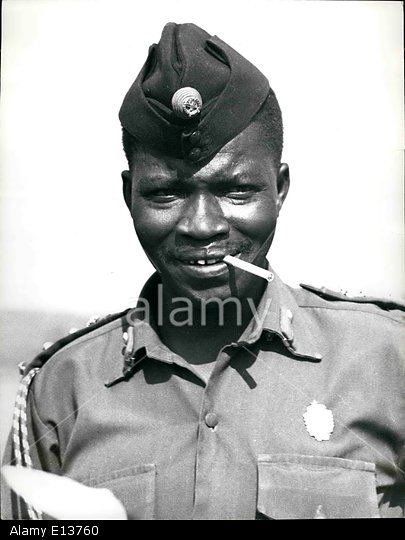
Col. Isaac Maliyamungu.
It is said that Maliyamungu was a gate man at the then Nyanza Textiles factory in Jinja before joining the army.
At the time of the 1971 coup, Maliyamungu rose to fame as he commandeered a tank at an entrance to a terminal at the Entebbe International Airport. Reports indicate Maliyamungu was responsible for the gruesome killing of several perceived regime opponents including the then Mayor of Masaka Francis Walugembe, killed in 1972.
He also rose through the ranks, at one time serving as Army Chief of Staff. In 1979, Maliyamungu was to command an elite tank crew force that gave the TPDF a hard time in areas near the Uganda border with Tanzania. But after the defeat of the Uganda Army (UA) Maliyamungu fled to Congo (present day Democratic Republic of Congo), where he reportedly died in the 1980s.
Prof. Edward Rugumayo
A renowned scholar and politician, Prof Rugumayo was born in 1934 in Kyenjojo District. He attained his university education at the University of London, graduating with a Bachelor of Science degree in Botany and Ecology.
After graduation, Rugumayo worked at Kyambogo (the Uganda Technical Institute) before moving to Makerere as warden for Mitchell Hall. After the 1971 coup he was appointed Minister for Education by Idi Amin but was to resign in 1973, making him one of the few persons to openly snub Amin. He fled to exile in Kenya, and returned to Uganda in the Uganda National Liberation Front (UNLF) government after Amin’s ouster in 1979.
In the subsequent government he was to hold the all-powerful position of Chairman of the National Consultative Council (NCC), the de facto Parliament of the time and reports indicate he was instrumental in ousting the first post-Amin president, Professor Yusuf Lule.
Lule was replaced by Godfrey Binaisa. In May 1980, while Rugumayo was in Arusha Tanzania, Binaisa was also deposed in another coup d’état and this time Rugumayo stayed in exile until 1992, they year he returned to Uganda and joined the National Resistance Movement (NRM) government of Yoweri Museveni.
Under Museveni Prof Rugumayo served as Ambassador to South Africa, Minister of Internal Affairs and Minister of Tourism, Trade and Industry. In 2005, he was appointed Ambassador to France but he declined.

Brig. Ali Fadhul
Brig Fadhul reportedly hailed from Busoga, and was a provincial administrator under Idi Amin and is said to have committed a lot of atrocities during his time in government.
After the overtrow of Amin in 1979, little was heard of him till 1987, when he was arrested from his home in Bulamagi and charged with the murder of the former Administrative Secretary of Ankole, Xavier Tibayungwa in 1972.
President Museveni pardoned Fadhul and he was released in 2009. He stays at his home in Bulamaji.
A prince from Busoga, wanume Kibedi studied Law in London. Upon his return to Uganda, he was appointed Assistant Administrator General in the Ministry of Justice, a position he held up to 1969. That very year Wanuume became an advocate of the High court. He was also a partner with Binaisa and Company Advocates before he was appointed Minster for Foreign Affairs in 1971 by Idi Amin, a position he held up to 1973 when he resigned from his ministerial job and fled to England.
While in England, Kibedi taught law at the College of Law in Lancaster before forming Kibedi and company solicitors in London in 1975. In 1986 when Yoweri Museveni captured power, Kibedi was appointed ambassador and Uganda’s Permanent Representative to the UN, a position he served for a few years before returning to private practice in London.
He later returned home and is the current Chairman of the Immigration and Citizenship Board.
Cecilia Ogwal
Born in Dokolo (formerly Apac District), in 1946 Cecilia Atim Ogwal graduated from Nairobi University in 1970 with a Bachelor of Commerce degree. In the early 1980s Cecilia was to get involved in politics under the UPC, where she served as Assistant Secretary General between 1985 and 1992. She was also a Constituent Assembly Delegate (CAD) and participated in the making of the 1995 Constitution. She also serve3d as Member of Parliament for for the Lira Municipality, a seat she lost to UPC founding leader Obote’s son Jimmy Akena in 2006.
However, in 2011 Cecila Ogwal was to bounce back to Parliament this time as the Woman MP representing the newly-created Dokolo county. At the time she had defected from UPC to the Forum for Democratic Change (FDC).
She is the current Opposition Chip Whip in Parliament.
Prof. Yash Tandon
Yash Tandon was born in 1939 in Kaberamaido, Teso District and graduated with a B.Sc. in Economics from the London School of Economics in1961. He completed his doctorate studies in International Relations at the LSE in 1969 and returned to Uganda. Following Iddi Amin’s expulsion of Asians, Prof Tandon fled to exile in Kenya and later to the United Kingdom. He later got involved with politics and joined the anti-Amin forces, the UNLF, which toppled the latter in 1979.
On his return Prof Tandon was named to the National Consultative Council (NCC) where, together with other professors Dani Wadada Nabudere, Edward Rugumayo and Omwony Ojok, they became known as ‘the Gang of Four’.
When Binaisa’s regime collapsed in May 1980, Prof Tandon was to go back to exile again Kenya.
Dr John Luwuliza Kirunda
A medical doctor, John Luwuliza Kirunda was born in 1940 and was one of the strongest ministers in the Obote II regime, where he served as UPC Secretary General. Also, his stint at Internal Affairs between 1980 and 1985 is remembered for ‘detention without trial’ and the operation ‘panda gari’, where thousands of Ugandans were forced by soldiers and other security operatives to board trucks to unknown destinations, at times never to be seen alive again.
But after the ouster of Obote in 1985, Luwuliza Kirunda fled to exile in Zimbabwe, where he died in 2005 aged 65. His body was secretly returned to the country and buried at his home in Bulugodha, Busembatia in Busoga.
Yona Kanyomozi
A veteran politician, Yona Kanyamozi hails from western Uganda. He was and still is one of Uganda People’s Congress strongmen from that part of the country. In 1989 he participated in Constituent Assembly and from 2001 to 2006, he represented Uganda at the East African Legislative Assembly (EALA). He is currently in private life but is rumoured to be eying a seat in Ntungamo.
Sam Tewungwa
He served as Minister for Regional Cooperation in the Obote II regime from 1980 to 1985.
Patrick Masette Kuuya
A teacher by profession, Patrick Masette Kuuya hails from Manafwa formerly Mbale District. He was one of the Uganda People’s Congress (UPC) strongmen in Mbale and served as Minister for Rehabilitation in the second Obote government between 1980 and 1985. When the regime was overthrown in 1985 he fled to exile in Kenya where he is teaching Applied Economics at Kenyatta University. It is said President Museveni has tried to persuade him to return in vain.

Prof. Adonia Tiberondwa
A teacher and politician, Prof Tiberondwa hailed from Bushenyi district. He was the first indigenous headmaster of Teso College Aloet, and also served in the second Obote government as Minister for Industry between 1980 to 1985. He also lectured at Makerere University and by the time of his death he was a member of the Uganda People’s Congress (UPC) Presidential Policy Commission. He died in December 2004.
Maj. Edward Rurangaranga
A staunch UPC supporter and close confidant of Apollo Milton Obote, ‘Major’ Edward Rurangaranga hails from Kitagata in Bushenyi District. He fled to exile after the coup of January 25, 1971 and although he has no known military background to his name, Rurangaranga was instrumental in the military efforts to oust Amin’s government. He returned to Uganda after 1979, and was to be appointed Minister of State in the Office of the Prime Minister after Obote won the contested elections in December 1980.
When the Obote II regime collapsed in 1985, Rurangaranga fled the country and returned in March 1986, only to be arrested by the NRA and detained at Luzira for five years. On January 21, 1991, he was set free and up to now he is still a staunch member of the UPC.
Chris Rwakasisi
In the 1960s Chris Rwakasisi rose through the UPC ranks to become the party’s youth organizer at the headquarters. In 1963, he got a scholarship to study in Russia, graduating in 1968 and later getting a job at the National Trading Corporation, as the the company’s legal secretary and public relations officer.
After the 1971 coup Rwakasisi was arrested and held in Makindye military barracks for six months and when he was released he went into private business. In 1972 he fled to exile in Nairobi until 1979 when he returned as one of the liberators under the UNLF.
After the 1980 elections Rwakasisi was appoimnted the Minister of Security under the second UPC regime, serving in that capacity from 1980 to 1985. After the Okello coup of 1985, Rwakasisi was arrested and later in 1988 convicted for kidnap with intent to murder and sentenced to death.
In 2009 he was pardoned by President Museveni and released from Luzira maximum prison, where he had spent twenty years.
He is currently a Presidential Advisor.
Emmanuel Tumusime Mutebile.
A former Guild President at Makerere University, Emmanuel Tumusiime-Mutebile was born on 27 January 1949 in Kabale District. He studied at Kigezi College Butobero, Makerere College School and Makerere University.
In 1972 criticised the expulsion of Asians from Uganda by Amin and, fearing for his life fled to England where he completed his education Durham University in 1974.
Between 1979 and 1984, Tumusiime-Mutebile held very high profile government positions including Deputy Principal Secretary to the President in 1979; Undersecretary in the Ministry of Planning in 1981; Senior Economist and then Chief Economist in 1984.
In 1992, he was appointed Permanent Secretary of the Ministry of Finance, Planning & Economic Development.
Today, Mutebile is the longest serving Governor of the Central Bank.
Ali Kirunda Kivenjinja.
Al Hajji Ali Kirunda Kivenjija was born in 1935 in Busoga. He studied at Kibuli Junior School, Busoga College Mwiri and at Madras College before obtaining a Bachelor of Science Degree in Zoology at Delhi University.
While in India Kivejinja was active in politics and served as the Treasurer of the African Students Association.
He joined the UPC upon his return to Uganda in 1962 and served a political mobilizer for the then ruling political party.
In the early 1980s Kivejinja joined the Uganda patriotic Movement (UPM) of Yoweri Museveni and when the party lost in the 1980 elections, he fled to exile. He was to return to Uganda after Museveni rode to power in 1986 and has since served in various high profile positions, the highest being Third Deputy Prime Minister. He was also a long-serving Member of Parliament for Bugweri County bfore being trounced by youthful lawyer Abdu Katuntu. He is currently in ‘semi-retirement’ but still hold influence in the ruling party, the NRM, where he serves as the Central Executive Committee member representing the elders.
Boniface Byanyima
Mzee Boniface Byanyima is one the most prominent members of the Democratic Party (DP) in western Uganda and served was the longest serving National Chairman of the party until his retirement. He is also said to have participated in bringing up President Museveni and he is father Engineer Winnie Byanyima, a wife to former FDC President Dr. Kiiza Besigye. The daughter is the current Executive Director of Oxfam International.
Jaberi Bidandi Ssali
Jaberi Bidandi Ssali was born on July 17 1937 in Butambala, Gomba. He studied at a university in Pakistan but did not complete his degree in Agriculture.
During the 1960s Bidandi was a UPC youth mobiliser but kept a low profile after the ouster of Milton Obote in 1971. At one time he coached the Uganda Cranes, playing a pivotal role in their most prestigious placing at the Africa Cup of Nations, when the Cranes were runner-up. Between 1979 and 1980 Bidandi joined the Uganda Patriotic Movement (UPM) but again went silent when Museveni went to the bush. However, he was to resurface on the national scene after 1986, when Museveni came to power and named him Minister for Local Government from 1989 to 2004, making him the longest serving person to hold that portfolio under Museveni.
In 2004, he resigned from the Cabinet after disagreeing with Museveni over the latter’s desire to run for a third term as President. He formed his own party called the People’s progressive Party (PPP) but is currently not active in politics because of health related problems.
Bidandi holds the degree of Bachelor of Arts in Local Governance and Human Rights, obtained from Uganda Martyrs University, Nkozi.
Maj. Gen. David Oyite Ojok
Major General David Oyite Ojok was born in 1942 and rose through the army ranks to become the first post-Amin army Chief of Staff of the Uganda National Liberation Army (UNLA).
A graduate of the prestigious Sandhurst Military Academy, Oyite Ojok was heavily involved in pursuing Yoweri Museveni’s NRA and Andrew Kayira’s Uganda Freedom Movement (UFM) combatants in the jungles of central Buganda, particularly in Luwero, where his helicopter was brought down in December 1982, dying at 40.




